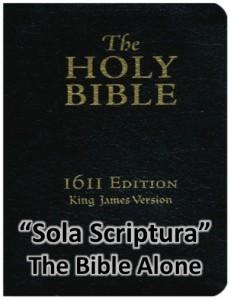About Protestantism
Various aspects of Protestantism, including but not limited to views on salvation, Bible versions, history, and denominations.
True Christianity seeks to ensure that all Christian teaching (doctrine) and Christian living is in agreement with Scripture (the Bible). The Protestant Reformation came about with this purpose in mind… an attempt – by many Catholic priests, monks and other Catholics – to reform (correct) the Catholic church to be in line with bible teachings. This is where the expression “Sola Scripturea” com from – which is Latin for Scripture Alone. The teachers and preachers who grew of out this “protestant” movement were protesting against many serious religious issues of their time:
- First and foremost: false teachings about salvation
- False teachings about God, Mary, Jesus and man’s own spiritual condition
- Serious abuses of power in the Catholic leadership
- Morally corrupt church leaders

The Five Articles of the Remonstrants
The Five Articles of the Remonstrants
(Arminian Heresy)
These are often referred to as the 5 points of Arminianism, a “free-will” heresy to which the 5 points of Calvinism were written to address.
Article 1.
[Conditional Election – corresponds to the second of TULIP’s five points, Unconditional Election]
That God, by an eternal and unchangeable purpose in Jesus Christ his Son before the foundation of the world, has determined that out of the fallen, sinful race of men,… Continue reading
The Heidelberg Catechism
The Heidelberg Catechism
This is an HTML adaption of the e-text version provided by “The Christian Classics Ethereal Libray” (CCEL). The text version is located at http://www.ccel.org/creeds/heidelberg-cat-ext.txt
Brief History of the Heidelberg Catechism
One of the symbolical books of the Reformed Church. Its name is derived from the city in which it was compiled and first printed. It is also sometimes styled the Palatinate Catechism, from the territory (the Palatinate) of the prince (Frederick III) under… Continue reading
Martin Luther’s 95 Theses (1517)
Disputation of Doctor Martin Luther
on the Power and Efficacy of Indulgences
by Dr. Martin Luther (1517)
Out of love for the truth and the desire to bring it to light, the following propositions will be discussed at Wittenberg, under the presidency of the Reverend Father Martin Luther, Master of Arts and of Sacred Theology, and Lecturer in Ordinary on the same at that place. Wherefore he requests that those who are unable to be present and debate orally… Continue reading
The Nicene Creed
The Nicene Creed
There are two versions of the Nicene Creed. One written in 325AD and one written in 381AD.
First Council of Nicea (325 A.D. Version)
We believe in one God, the Father Almighty, Maker of all things visible and invisible.
And in one Lord Jesus Christ, the Son of God, begotten of the Father [the only-begotten; that is, of the essence of the Father,
God of God], Light of Light, very God of very… Continue reading
The Apostle’s Creed
The Apostle’s Creed
There are several versions of the Apostle’s Creed that vary according to what church or denomination you are referring to. Whe will present the Lutheran version here since it substitutes the more accurate word “Christian” for the word “Catholic” commonly found in Apostle’s creed (fifth line from the bottom in the creed presented below).
Lutheran Church Version:
- I believe in God, the Father Almighty,
- maker of heaven and earth.
- And in Jesus Christ, his only… Continue reading

















